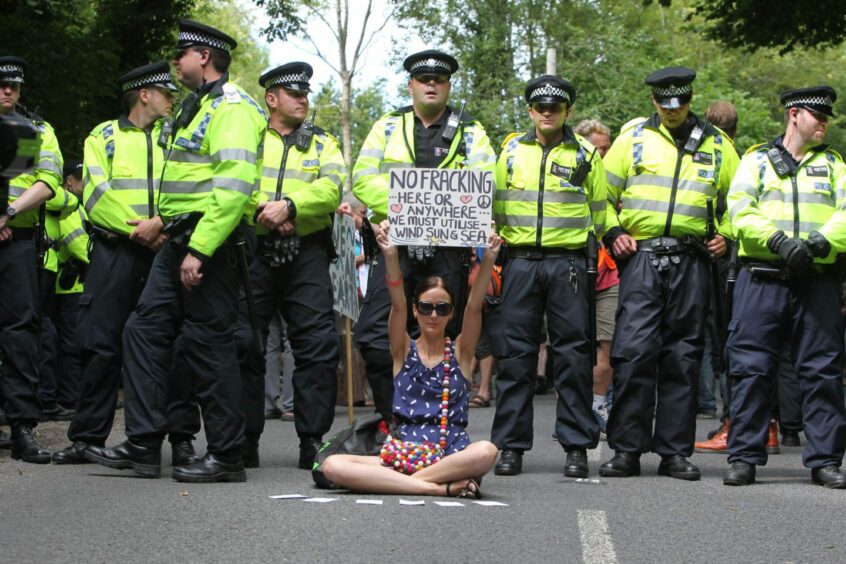
This is the stuff of a Whitehall Farce.
The very day that the latest version of the UK Government says it is going to take the shackles off prospecting for onshore shale gas, one of the putative industry’s most respected figures states unequivocally that shale gas extraction won’t work here.
That uber-arrogant “Lord Snooty” of the Commons, Jacob Rees-Mogg has brayed that nothing is going to get in his way. The moratorium on shale gas prospecting is to be lifted.
Indeed, after the Budget of September 23, the Business Secretary accused those who oppose fracking of ‘hysteria’ and ‘ludditery’ and said prospecting for shale gas was in the ‘national interest’!
By that he meant England’s interest.
Rees-Mogg even stupidly claimed that opponents were being funded by the Kremlin.
He appeared to pay zero attention to the fact that, that very same day, the geologist behind Cuadrilla Resources, 6, warned that hunting for shale gas onshore in Britain would not help with the energy price crisis and would not be possible on any meaningful scale.
Cuadrilla Resources was founded by Cornelius in 2007 and hit the headlines for all the wrong reasons several years ago when it attempted to drill the UK’s first commercial onshore hydraulically fractured wells in Lancashire over the period 2011-18, stirring up massive opposition because of the seismic shocks associated with that programme.
“I don’t think there is any chance of fracking in the UK in the near term,” Cornelius told the Guardian newspaper.
Despite encouraging studies carried out by British Geological Survey, including its 2013 report, Cornelius has now warned: “No sensible investors” would take the risk of embarking on large projects here.
“It’s very challenging geology, compared with North America. “It is “heavily faulted and compartmentalised”.
While he did not rule out the potential for limited localised successes, Cornelius warned: “They will never be at scale, because the capital costs are a huge issue.”
That is one hell of an admission given that this appears to be at odds with Francis Egan, Current CEO of Cuadrilla.
As for British Geological Survey, one can sense deepening concern at the agency that the optimistic shale gas story peddled at the start of the 1990s is not the top seller that it had hoped for.
This year, at the behest of the government, BGS published an update report that admits concern.
“This report concludes that forecasting the occurrence of large earthquakes and their expected magnitude is complex and remains a scientific challenge.
“As a result, our ability to evaluate and mitigate risks from hydraulic fracturing-induced seismicity and predict the occurrence of larger earthquakes during hydraulic fracturing operations is also a challenge.”
On the subject of contamination risk, the UK Groundwater Forum warns: “Groundwater may be potentially contaminated by extraction of shale gas both from the constituents of shale gas itself, from the formulation and deep injection of water containing a cocktail of additives used for hydraulic fracturing and from flowback water which may have a high content of saline formation water.”
But in 2018, BGS said it had developed a methodology for assessing the level of risk posed to aquifers across England and came to the following conclusion: “Most aquifers were rated as being at low risk from contamination. There were occasional instances of medium to low risk ratings for important aquifers with a smaller separation from the oil and gas sources.
“Medium/high risk groups occur rarely, where important aquifers overlie shale gas and coal bed methane activities. There are no potential receptors in the high risk group in the case studies.”
They had better be right. England is a very crowded place; its water resources are under massive pressure and, at the surface, suffering massive contamination because, scandalously, government has allowed water companies to ride roughshod.
Add shale gas extraction mistakes to that list and the cocktail becomes even more dangerous.
At the invitation of BGS, Ian Davey, senior specialist from the Environment Agency has stuck his neck out by saying: “This tool should help identify vulnerable areas at an early stage and ensure that our groundwater remains protected. We will not issue permits unless a company can demonstrate how it will provide the high level of protection required.”
But, with reports that it is all over the shop in what it does, can the EA be trusted? Bear in mind the massive budget cut imposed on parent Defra by now PM Liz Truss when she was in charge.
Happily, here in Scotland, so long as the SNP is in power shale won’t happen. It seems we are safe from the Jacob Rees-Moggs of this world; not forgetting Truss, who is also pro-shale.
